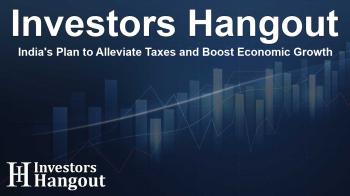India's Plan to Alleviate Taxes and Boost Economic Growth

India's Tax Considerations for Economic Growth
India is currently evaluating the possibility of reducing personal income taxes for individuals earning up to 1.5 million rupees annually. Such a move is intended to alleviate financial burdens on the middle class and enhance overall consumption within the economy. As a response to slowing economic growth, this initiative is under serious consideration for inclusion in the upcoming budget.
Potential Benefits for Taxpayers
If implemented, the tax cut could positively impact millions of taxpayers, particularly those residing in urban areas where the cost of living continues to rise. The proposal aims to encourage taxpayers to adopt a newer tax regime introduced in 2020, which simplifies the taxation process by eliminating many exemptions, including those for housing rentals.
Understanding the Tax Structures
Under the current tax system, individuals can choose between two plans. The traditional plan permits various exemptions but has higher overall tax rates. Meanwhile, the newer approach offers lower tax rates for annual incomes ranging from 300,000 to 1.5 million rupees, taxed at rates of 5% to 20%. Earnings above this threshold face a flat tax rate of 30%.
Political and Economic Considerations
With pressure mounting from the middle class regarding high tax rates, the government is under increasing scrutiny as wage growth does not keep pace with inflation. Many citizens express concern over the recent spike in living costs, particularly amidst high food inflation that has affected discretionary spending.
The Need for Strategic Changes
Given the challenges of high inflation rates which hinder consumer spending on basic essentials and luxury goods alike, there is a pressing need for strategic adjustments. Making taxation easier and more favorable for the average citizen could potentially drive demand, helping to lift the overall economy.
Future Implications
While no concrete decisions have been announced yet, government sources indicate that any fiscal adjustments would be determined as the budget deadline approaches. These reforms could lead to a significant shift in the revenue landscape, especially as the majority of income tax is generated from individuals earning over 10 million rupees.
Frequently Asked Questions
What is the proposed tax cut in India aimed at?
The proposed tax cut seeks to relieve financial pressure on the middle class and stimulate economic growth through increased consumption.
How could changing tax rates affect the economy?
Reducing tax rates may encourage more individuals to choose simpler tax regimes, thereby increasing disposable income and potentially boosting economic activity.
What are the tax rates under the newer tax system?
The newer tax structure taxes incomes between 300,000 and 1.5 million rupees at rates of 5% to 20%, while incomes above that threshold are taxed at 30%.
Why are high taxes a concern for the middle class?
High taxes coupled with stagnant wage growth amidst rising inflation create financial strain for the middle class, leading to demands for reform.
What might be the timeline for any tax reforms?
Decisions regarding tax adjustments are anticipated to be finalized as budget discussions progress, with an announcement expected in early February.
About Investors Hangout
Investors Hangout is a leading online stock forum for financial discussion and learning, offering a wide range of free tools and resources. It draws in traders of all levels, who exchange market knowledge, investigate trading tactics, and keep an eye on industry developments in real time. Featuring financial articles, stock message boards, quotes, charts, company profiles, and live news updates. Through cooperative learning and a wealth of informational resources, it helps users from novices creating their first portfolios to experts honing their techniques. Join Investors Hangout today: https://investorshangout.com/
Disclaimer: The content of this article is solely for general informational purposes only; it does not represent legal, financial, or investment advice. Investors Hangout does not offer financial advice; the author is not a licensed financial advisor. Consult a qualified advisor before making any financial or investment decisions based on this article. The author's interpretation of publicly available data shapes the opinions presented here; as a result, they should not be taken as advice to purchase, sell, or hold any securities mentioned or any other investments. The author does not guarantee the accuracy, completeness, or timeliness of any material, providing it "as is." Information and market conditions may change; past performance is not indicative of future outcomes. If any of the material offered here is inaccurate, please contact us for corrections.
